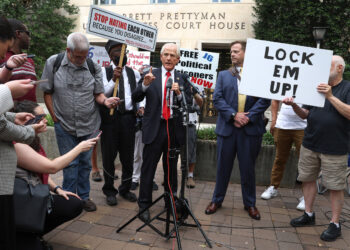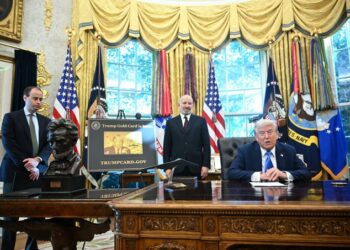Scott Bessent, nominated by President Donald Trump for Secretary of the Treasury, addressed the Senate on Thursday during his confirmation hearing, emphasizing his vision for the U.S. economy and fiscal policy. His remarks underscored his private sector experience, his commitment to national security, and his intent to tackle the country’s growing fiscal challenges.
Economic Vision and National Security Focus
Bessent began his opening statement by acknowledging his family’s support and personal history, highlighting his journey from a working-class background to a successful career in finance. Raised in South Carolina, Bessent shared how he started working at a young age after his father’s financial struggles and later gained a foothold in the finance industry with a Yale education and an early internship. “I’ve been involved in the financial markets ever since,” he said, reflecting on a career spanning 40 years and nearly 60 countries.
He described President Trump’s administration as having a “generational opportunity” to usher in a new economic era. Bessent sees this moment as one where policies can be implemented to create jobs, foster prosperity, and reverse what he perceives as a decline in opportunities for working-class Americans. His approach will focus on securing U.S. supply chains, carefully deploying sanctions, and ensuring the U.S. dollar remains the world’s reserve currency.
Bessent’s Full opening statement:
Scott Bessent's Confirmation Hearing Opening Statement pic.twitter.com/J1RCMUdlem
— Bannon’s WarRoom (@Bannons_WarRoom) January 16, 2025
Tackling Fiscal Challenges and Deficits
Bessent did not shy away from discussing the pressing issue of federal spending. “We have a spending problem, not a revenue problem,” he emphasized. Bessent noted that U.S. federal government revenues have hovered around 17-17.5% of GDP, while spending has surged to about 24-25%. This gap, leading to a 6-7% budget deficit, is unsustainable, he warned. “We must get our fiscal house in order,” Bessent stated, advocating for prioritizing productive investments that drive growth and reducing wasteful spending that exacerbates inflation.
His plan also includes making the 2017 Tax Cuts and Jobs Act permanent, focusing on pro-growth policies that reduce the tax burden on manufacturers, service workers, and seniors. He called for reducing the tax burden on American businesses and ensuring that economic policies create more opportunities for middle-class families.
Response to Sen. Grassley’s Question on Whistleblower Program
During the hearing, Bessent was asked by Senator Chuck Grassley about his stance on expanding the IRS Whistleblower Program, which Grassley championed. The program, established in 2006, has led to billions in recovered revenue for the U.S. Treasury by encouraging individuals to report tax fraud and evasion.
Bessent expressed full support for the program, stating, “We are in complete alignment on this program.” He recognized its potential to bring in billions more in revenue and pledged to work with Grassley to ensure it operates at full capacity, should he be confirmed. His support reflects a broader commitment to cracking down on tax loopholes and improving the IRS’s ability to detect fraud.
Check out this quick clip of Bessent:
Scott Bessent: "We Do Not Have A Revenue Problem In The United States Of America, We Have A Spending Problem" pic.twitter.com/KzHbzhHhuX
— Bannon’s WarRoom (@Bannons_WarRoom) January 16, 2025
A New Economic Era
In his concluding remarks, Bessent reaffirmed his belief in the President’s economic vision. He stressed that, if confirmed, he would collaborate closely with lawmakers to implement policies that could usher in an era of growth and prosperity. “Together, we can usher in a new era of prosperity that will lift up all Americans and rebuild communities and families across the country,” Bessent concluded.
Bessent’s nomination is likely to face close scrutiny, but his commitment to fiscal responsibility, market-driven policies, and national security will likely resonate with lawmakers seeking a new direction in economic leadership. His experience, paired with his clear support for reforming the IRS and curbing government spending, positions him as a key figure in shaping the Trump administration’s economic policies moving forward.



